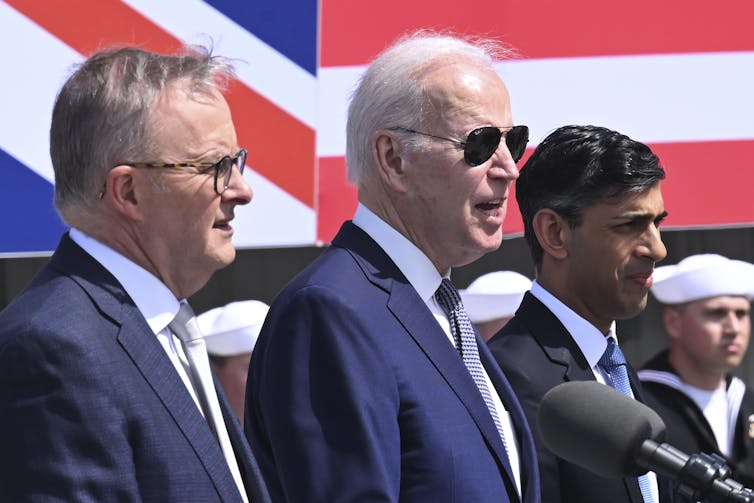Paul Keating lashes Albanese government over AUKUS, calling it Labor's biggest failure since WW1
- Written by Michelle Grattan, Professorial Fellow, University of Canberra

Former Prime Minister Paul Keating has launched a swingeing attack on the Labor government over the AUKUS submarine agreement, accusing Anthony Albanese of relying on “two seriously unwise ministers, Penny Wong and Richard Marles”.
Keating lashed the deal for a tripartite build of nuclear-powered submarines as “the worst international decision by an Australian Labor government since the former Labor leader, Billy Hughes, sought to introduce conscription” in the first world war.
“We have gone from a defend Australia to a forward defence policy,” Keating said, while insisting China posed no threat to Australia.
He made his criticisms in a long speech and question-and-answer session at the National Press Club.
In a direct challenge to Albanese, Keating said:
I dare the prime minister to explicitly suggest or leave open the question that Australia might go to war over Taiwan – at the urgings of the United States or anyone else.
Keating said the Chinese had never implied or said they would threaten Australia. He added that threatening Australia would mean “an invasion”.
It doesn’t mean firing a few missiles off the coast like the Japanese submarines did in 1943, firing a few things into the eastern suburbs of Sydney.
It would mean bringing an armada of ships with a massive army to invade, which it would not be possible for the Chinese to do. “We wouldn’t need submarines to sink an armada,” he said.
Keating said one of the critical problems in Australian policy was “that defence has overtaken foreign policy. As a consequence, we’re not using diplomacy.”
He recalled saying previously that Taiwan was not a vital interest of Australia’s – and that remained the case.
In earlier times, he said Labor has “invariably got the big international ones right”. This includes former Labor leaders Arthur Calwell opposing Australian military participation in the Vietnam war and Simon Crean opposing the Iraq war.
This one, AUKUS, is where Labor breaks its winning streak of now over a century.
Falling into a major mistake, Anthony Albanese, befuddled by his own small target election strategy, emerges as prime minister with an American sword to rattle at the neighbourhood to impress upon it the United States’ esteemed view of its untrammelled destiny.
Labor quickly supported AUKUS while in opposition after then-Prime Minister Scott Morrison announced it with the US and UK leaders in 2021.
And after the announcement of the submarine program details, which could cost Australia up to A$368 billion over three decades, Albanese said “a new chapter in the relationship between our nation, the United States and the United Kingdom begins”.
Keating said he had generally found Albanese to be responsive to his calls, texts and emails. But last month when he spoke to an Albanese staffer seeking a conversation with the PM especially about AUKUS, the message was delivered but Keating said he “heard nothing” from the prime minister.
“The fact is, he did not wish to hear the message or have the conversation,” he said.
Keating was especially scathing about Wong, the foreign minister, and Marles, the defence minister.
“Penny Wong took a decision in 2016, five years before AUKUS, not to be at odds with the Coalition on foreign policy on any core issue,” he said. Under this approach, “you may stay out of trouble but you are compromised. Self compromised.”
Though Keating said Marles was “well-intentioned”, he believed the defence minister was “completely captured by the idea of America.”
And the then-opposition leader [Albanese] not ever having displayed any deep or long-term interest in foreign affairs, fell in with Wong and Marles as leader of the great misadventure.
Keating said Albanese this week “screwed into place the last shackle in the long chain the United States has laid out to contain China”.
No mealy-mouthed talk of ‘stabilisation’ in our China relationship or resort to softer or polite language will disguise from the Chinese the extent and intent of our commitment to United States’ strategic hegemony in East Asia with all its deadly portents.
Among his targets, Keating also attacked Andrew Shearer, the head of the Office of National Intelligence, and the Australian Strategic Policy Institute. He said, “remarkably, a Labor government has picked up Shearer’s neo-con proclivities and those of ASPI”, describing the latter as “a pro-US cell” headed by a former chief of staff to ex-Foreign Minister Marise Payne.
He also attacked journalists, including those asking questions, telling one he should hang his “head in shame” for the articles he had co-authored.
Keating said the majority of the Labor party in the branches would share his views, saying when the average branch member “gets onto this […] there will be a big reaction”.
Authors: Michelle Grattan, Professorial Fellow, University of Canberra




